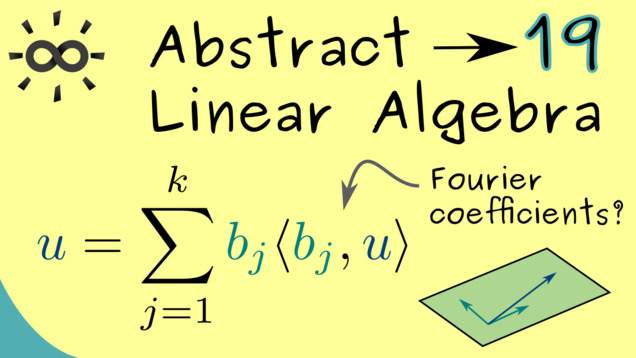
-
Title: Fourier Coefficients
-
Series: Abstract Linear Algebra
-
Chapter: General inner products
-
YouTube-Title: Abstract Linear Algebra 19 | Fourier Coefficients
-
Bright video: https://youtu.be/1t4OCKYS80w
-
Dark video: https://youtu.be/hXhiRkfx7bk
-
Quiz: Test your knowledge
-
Dark-PDF: Download PDF version of the dark video
-
Print-PDF: Download printable PDF version
-
Thumbnail (bright): Download PNG
-
Thumbnail (dark): Download PNG
-
Subtitle on GitHub: ala19_sub_eng.srt missing
-
Timestamps (n/a)
-
Subtitle in English (n/a)
-
Quiz Content
Q1: Let $V$ be a $\mathbb{F}$-vector space with inner product $\langle \cdot, \cdot \rangle$ and $U \subseteq V$ be a $k$-dimensional subspace with an ONB $\mathcal{B} = (e_1, \ldots, e_k)$. What is not correct?
A1: Each $u \in U$ can be written as a linear combination with vectors from $\mathcal{B}$.
A2: Each $u \in U$ can be written as $ u = \sum_{j=1}^k e_j \langle e_j, u\rangle$.
A3: Each $u \in U$ can be written as $ u = \sum_{j=1}^k \lambda_j e_k $, where $\lambda_j$ are called the Fourier coefficients.
A4: There is a $u \in U$ that is orthogonal to all vectors from $\mathcal{B}$.
Q2: Let $V$ be the real vector space of continuous functions on $[0,2 \pi]$ with inner product $\langle f, g\rangle = \int_0^{2\pi} f(x) g(x), dx$. Are the $\cos$ and $\sin$ function orthogonal in this space?
A1: Yes, the integral is 0.
A2: No, they are not normalized.
A3: No, the integral gives 1.
A4: The inner product is not well-defined.
Q3: Let $V$ be the real vector space of continuous functions on $[0,2 \pi]$ with inner product $\langle f, g\rangle = \int_0^{2\pi} f(x) g(x), dx$. Do $(\cos, \sin)$ form an ONS here?
A1: No!
A2: Yes!
A3: One needs more information.
Q4: Let $V$ be the real vector space of continuous functions on $[0,2 \pi]$ with inner product $\langle f, g\rangle = \int_0^{2\pi} f(x) g(x), dx$. Here $(e_1, e_2, e_3) = (\frac{1}{\sqrt{2\pi}}, \frac{1}{\sqrt{\pi}} \cos, \frac{1}{\sqrt{\pi}} \sin ) $ form an ONS. What are the Fourier coefficients for the function $f(x) = 1 + \cos(x)$?
A1: They are $\langle e_1, f\rangle = \sqrt{2 \pi} $, $\langle e_2, f\rangle = \sqrt{ \pi} $, $\langle e_3, f\rangle = 0 $.
A2: They are $\langle e_1, f\rangle = \sqrt{\pi} $, $\langle e_2, f\rangle = \sqrt{ \pi} $, $\langle e_3, f\rangle = \sqrt{ \pi} $.
A3: They are $\langle e_1, f\rangle = 1 $, $\langle e_2, f\rangle = 1 $, $\langle e_3, f\rangle = 0 $.
A4: They don’t exist.
-
Last update: 2024-11